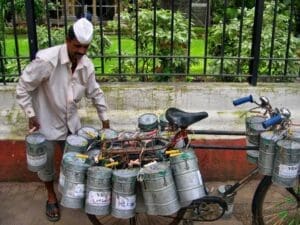 There was a time when Mumbai’s dabbawalas (lunchbox carriers) were known for their efficient supply chain and logistics. But the COVID-19 incursion changed the lives and livelihoods of Mumbai’s dabbawalas. Their lives can neatly be compartmentalized into BC and AC – before COVID-19 and after COVID-19.
There was a time when Mumbai’s dabbawalas (lunchbox carriers) were known for their efficient supply chain and logistics. But the COVID-19 incursion changed the lives and livelihoods of Mumbai’s dabbawalas. Their lives can neatly be compartmentalized into BC and AC – before COVID-19 and after COVID-19.
Scenario Before COVID-19
Mumbai’s dabbawala service was legendary for its reliability. This service was started in 1890 by a Parsi banker who wanted to have home-cooked food in office daily. The idea caught the fancy of many office-goers and the number of dabbawalas swelled to 100. Demand and supply were well matched. There were two categories of migrant labor who exemplified the demand and supply sides:
- White collar workers: At that time there were no fast food joints or office canteens and as more families migrated to the city to work they needed a service like this
- Illiterate/semi-literate workers: They had travelled to the cities as the returns from agricultural produce were inconsistent and not sufficient to support their families. Although they lacked education they were willing to work hard
As Mumbai’s population grew, so did the demand for the dabbawalas. Today, the 5,000 or so dabbawalas in the city have an enviable record; they deliver (and return) over 200,000 lunchboxes throughout Mumbai with hardly any delays or mistakes. They follow a coding system to identify the destination and recipient – initially it was simple color coding, now it has evolved into alpha numeric characters. Each dabbawala contributes in kind – two bicycles, a wooden crate, and his own uniform that comprises of white cotton kurta-pyjamas, and the white Gandhi cap. After collecting and sorting the dabbas into groups they are put into coaches of local trains and handed over to local dabbawalas at the specified station.
The world-class service logistics with almost no technology inputs have baffled global logistics companies and e-commerce giants. Many business schools include their case study as a part of their curriculum. The success of this business model is proof that with efficient and well-coordinated teamwork the results can be extraordinary.
In the late 90s a documentary was made about them and many articles followed. At the beginning of this century a full-length documentary was made by the Carnegie Mellon University. But what got maximum publicity was when Prince Charles interacted with the dabbawalas at the Churchgate station during his official visit to Mumbai in 2003; and two years later two of their office bearers were invited for his wedding.
The supply chain was moving smoothly till mid-March this year, and then came the COVID-19…
After the COVID-19 Onslaught
When the lockdown was announced the dabbawalas panicked because offices were closed and local trains (their commuting lifeline) were suspended. Suddenly their only source of income was strangulated and many returned to their villages. Some of them had their agricultural farms to fall back on, but then came Cyclone Nisarga that destroyed their crops. The lockdown has left them jobless for months and many have not received payment for their services in February and March. The Mumbai Dabbawala Association says that they are not in a position to restart their work as many have gone to their hometowns and are unable to return. Although the local train services resumed mid-June, it was meant only for essential staff of the state government.
The dabbawalas stare at a bleak future. When housing societies are strict about visitors, they will certainly disallow entry for dabbawalas. Several NGOs, film stars and citizens have come forward to help them with daily rations; and the government distributed ration kits. Although help has been forthcoming it is sporadic and fragmented. The Association has requested the government for financial aid for monthly sustenance.
Appreciating their contribution to daily sustenance, a larger-than-life statue of a dabbawala was installed at Mumbai’s Haji Ali junction in 2017. The people who delivered dabbas like clockwork across the city daily are today struggling to feed their own families. These are the people who through their resourcefulness and diligence proved that high-quality service can be provided with a low-cost and simple operating system. It will be quite some time till we again see the familiar kurta-pyjama clad dabbawalas rushing to catch the local trains.























